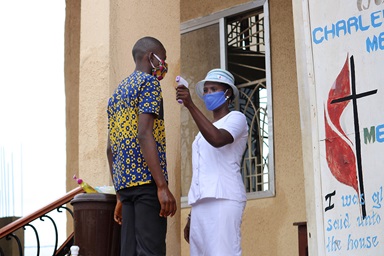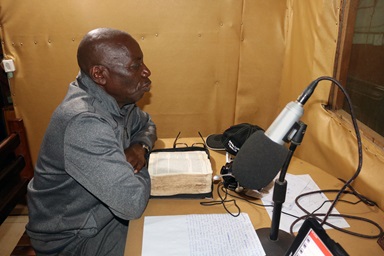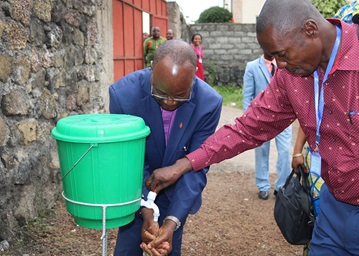East Congo Bishop Gabriel Yemba Unda said he is concerned by the latest attacks by armed groups on Ebola treatment centers in the Congo.
“I invite the entire community of Beni and Ituri to help the response teams on the ground to eradicate this deadly disease and also avoid violence at Ebola treatment centers,” Unda said.
The attacks come as The United Methodist Church and others continue to fight a growing epidemic that has killed nearly 600 people since the outbreak began in August.
According to the Associated Press, a fourth assault on a health center was reported on March 14. The incident followed an earlier weekend attack that left a police officer dead and three health officials injured.
World Health Organization Director-General Tedros Adhanom Ghebreyesus, who recently returned from a three-day visit to the Congo, told the AP that the attacks threaten to reverse the gains being made against the outbreak.
It is the second-largest Ebola outbreak in history, surpassed only by the 2014-16 West Africa outbreak that killed more than 11,000 people.
According to the most recent WHO reports, the number of Ebola cases in the Congo is at 951, with 886 confirmed and 65 probable cases, and 598 deaths.
The United Methodist Church in eastern Congo has lost more than 80 members in Beni and Ituri, said the Rev. Ezekiel Mathe, Beni District superintendent.
The wife of a district superintendent also has died from Ebola after accompanying her husband on evangelism missions in the region, said Pierre Kambali, a member of Mangango United Methodist Church.
“I pray for God to put end to this disease of Ebola in the region because it’s a loss for The United Methodist Church,” Mathe said.
He said the outbreak has resulted in low attendance at United Methodist churches as the faithful fear coming into contact with the disease. And district superintendents and evangelists in the villages have been unable to reach areas of Beni because of insecurity.
Emile Usungu Ulangi, a lay leader in the Beni District, said the persistence of the disease in the region is due to several factors, including the insecurity caused by armed groups in the region, resistance from some in the population to recognize the disease, and a reluctance to trust health workers.
Following the recent attacks on the Ebola treatment centers in North Kivu, some partners have suspended humanitarian efforts, including Doctors without Borders.
The medical relief organization said doctors with the group were targeted in two recent attacks in Katwa on Feb. 24 and Butembo on Feb. 27. Doctors Without Borders suspended operations in both areas, but announced that it will continue its Ebola-related activities in other cities in North Kivu and the neighboring province of Ituri.
Dr. Damas Lushima, general coordinator of health for The United Methodist Church in East Congo, said the church is continuing to raise awareness in affected and unaffected areas in the region in partnership with the United Methodist Board of Global Ministires’ Global Health unit and nonprofit Harper Hill Global.
He said that the church may need to shift its awareness campaign to reach those people who don’t believe in the Ebola virus and to help those who have contracted the disease integrate back into society.
“As there is persistence of Ebola in Beni and its surroundings,” Lushima said, “I’m forced to double the efforts on awareness to break the pockets of resistance of this deadly disease.”
Kituka Lolonga is a communicator in the Kivu Conference. News media contact: Vicki Brown at (615) 742-5470 or [email protected]. To read more United Methodist news, subscribe to the free Daily or Weekly Digests
Like what you're reading? Support the ministry of UM News! Your support ensures the latest denominational news, dynamic stories and informative articles will continue to connect our global community. Make a tax-deductible donation at ResourceUMC.org/GiveUMCom.




